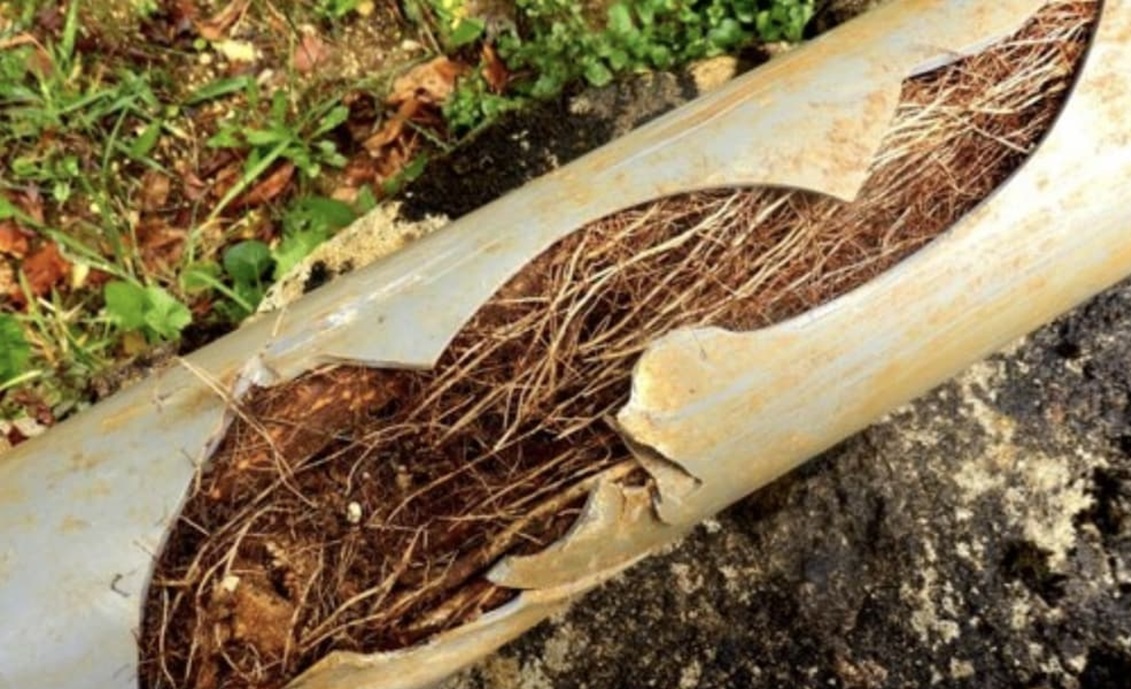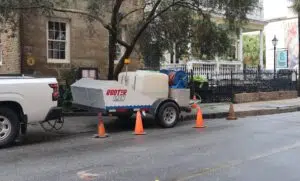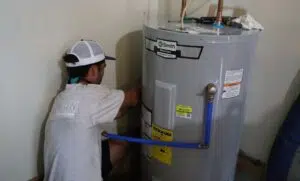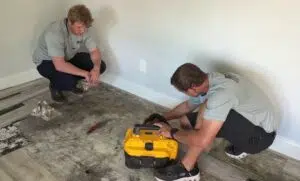It starts with a slow drain. Maybe the water in your sink takes a little longer to disappear, or your toilet struggles to flush.
Before you know it, your pipes are completely blocked, and you’re left dealing with an inconvenient (and often smelly) mess. Sewer line blockages are one of the most frustrating plumbing problems homeowners face, but they’re often preventable if you know what to look for.
Sewer lines are the hidden backbone of your home’s plumbing system, and when they get blocked, the results can be catastrophic. That’s why regular sewer line cleaning is essential, and knowing what causes these blockages can help you avoid them altogether.
Common Causes of Sewer Line Blockages
Sewer lines can become blocked for a variety of reasons. Some causes are more common than others, and understanding what leads to these clogs can help you prevent them.
Tree Roots
Tree roots are one of the most frequent culprits behind sewer line blockages, especially in older neighborhoods with mature trees. Roots naturally seek out sources of water, and they can detect the moisture from your sewer lines. Over time, these roots can invade the pipes through small cracks or joints. Once inside, they grow rapidly, creating a dense web that blocks the flow of water and waste.
This issue is particularly common in Charleston, where the region’s abundant tree cover adds to the risk. If you have large trees near your home, it’s crucial to schedule regular sewer line cleaning to prevent tree roots from causing significant damage.
Grease and Fat Build-Up
It might seem harmless to pour leftover grease or fat down the drain, but these substances can cause serious issues in your pipes. As grease cools, it solidifies, sticking to the walls of your sewer lines. Over time, this creates a blockage that can trap other debris and completely obstruct the pipe.
Even if you run hot water after pouring grease down the drain, the grease can still cool and harden further down the line. To avoid this, always dispose of grease and fat in the trash rather than the sink.
Flushing Non-Flushable Items
Toilets are designed to handle human waste and toilet paper—nothing more. Unfortunately, many people treat their toilets like trash cans, flushing items that don’t break down properly in water. Some of the most common offenders include:
- Wet wipes (even those labeled as “flushable”)
- Feminine hygiene products
- Paper towels
- Cotton swabs and pads
These items don’t disintegrate like toilet paper, and they can easily become lodged in your sewer line, causing a serious blockage. If you want to avoid calling in a plumber for sewer line cleaning, it’s crucial to only flush appropriate materials.
Foreign Objects
It happens more often than you’d think—a child drops a toy in the toilet, or an item accidentally falls into the sink and is washed down the drain. While these foreign objects may not seem like a big deal at first, they can become lodged in the pipes, especially if other debris builds up around them. Once a blockage occurs, it can be difficult to remove without professional help.
To prevent this, make sure everyone in your household knows what can and cannot go down the drain. In bathrooms, it’s a good idea to use drain covers to catch items before they become a problem.
The Role of Older Pipes in Sewer Line Blockages
In many homes, particularly older ones, the age of the pipes themselves can be a contributing factor to sewer line blockages. Over time, pipes can corrode, crack, or collapse entirely, restricting the flow of water and waste. Clay pipes, which were commonly used in the past, are especially prone to issues like cracking and root intrusion.
If your home has older pipes, it’s a good idea to have them inspected regularly. A professional plumber can use cameras to check the condition of your pipes and recommend repairs or replacements before serious blockages occur.
Signs of a Sewer Line Blockage
Now that we know the common causes of blockages, how can you tell if your sewer line is blocked? Some signs are subtle, while others are hard to miss. If you notice any of the following symptoms, it’s time to consider sewer line cleaning:
- Slow Drains: If water is draining slowly from multiple fixtures in your home, such as sinks, showers, and toilets, it could indicate a blockage in the main sewer line.
- Gurgling Sounds: When you flush the toilet or run the sink, do you hear strange gurgling noises coming from the drain? This is a sign that air is trapped in the pipes due to a blockage.
- Sewage Backups: One of the most unpleasant signs of a sewer line blockage is a sewage backup. This can occur in your toilets, bathtubs, or floor drains, and it often comes with a foul odor.
- Foul Odors: If you smell sewage or a foul odor coming from your drains, it could be a sign that a blockage is preventing waste from flowing properly.
- Lush Patches in the Yard: If certain areas of your yard are suddenly greener and more lush than others, it could be a sign that a sewer line is leaking due to a blockage or break. The nutrients from the waste can cause plants to thrive in those areas.
How to Avoid Sewer Line Blockages
While some sewer line blockages are unavoidable, many can be prevented with a few simple steps. Regular maintenance, mindful disposal of waste, and attention to your home’s plumbing system can go a long way in keeping your pipes clear and functional.
Regular Sewer Line Cleaning
One of the most effective ways to prevent blockages is through regular sewer line cleaning. Having your sewer lines cleaned professionally can remove debris, roots, and build-up before they cause a serious problem. Scheduling this service once a year is a good practice, particularly if you live in an older home or an area with large trees.
Proper Waste Disposal
As mentioned earlier, being mindful of what you put down the drain can prevent many blockages. Never pour grease, oil, or fat down the drain, and avoid flushing anything other than human waste and toilet paper. Educate everyone in your household about what can and cannot go into the plumbing system, and consider using drain covers to catch debris.
Tree Root Management
If tree roots are a concern, there are several steps you can take to protect your sewer line. In some cases, root barriers can be installed to prevent roots from reaching your pipes. If roots have already invaded your sewer line, a plumber can use specialized tools to remove them during a sewer line cleaning.
In extreme cases, tree removal may be necessary to prevent further damage. Consulting with a professional plumber or arborist can help you determine the best course of action.
Repairing and Replacing Old Pipes
If your home has older pipes that are prone to blockages, it may be time to consider repairs or replacements.
Upgrading to modern materials like PVC can help prevent future issues and improve the overall functionality of your plumbing system. A professional plumber can assess the condition of your pipes and recommend the best solution for your home.
Conclusion: Keep Your Sewer Lines Clear with Rooter-Man SC
Sewer line blockages are a major headache, but they don’t have to disrupt your life. Understanding the common causes—like tree roots, grease build-up, and flushing non-flushable items—can help you avoid costly repairs and keep your plumbing system running smoothly.
If you’re noticing signs of a blockage, it’s important to address the issue right away. At Rooter-Man SC, we specialize in sewer line cleaning and can help you tackle even the toughest blockages.
Our experienced team is available 24/7 for emergency services, and we’re committed to keeping your home’s plumbing in top shape.
Don’t wait until a small problem turns into a big one. Book an appointment today and let Rooter-Man SC keep your sewer lines clear and free of blockages.







